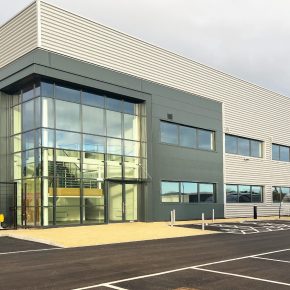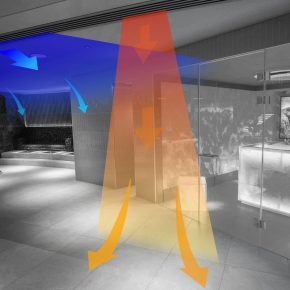
Flowcrete helps you choose the best resin floor for the job
The two main types of resin floors are polyurethanes (PU) and epoxies, and each has differing properties suited to particular uses so it’s important to choose the correct one for the job. Choosing the wrong flooring solution can result in costly repairs or even complete floor failure down the line.
While both are called resins, epoxy and PU floors should not be confused – it’s important to understand the differences between the two.
Admittedly they do share some similarities, such as being two-component systems (a resin and a hardener) that when brought together undergo a process of stoichiometric curing to form a solid layer. In both cases this results in a seamless, impervious coating that can be applied quickly in large quantities, but they are two very different types of materials with specific characteristics and uses.
 The main difference between these two types of materials is in the molecular structure, which affects how it fuses together during the curing process. There are multiple types of components that can be used and that will vary the end result slightly, but essentially PUs have a higher cross-linked density than epoxies, making them the harder wearing of the two.
The main difference between these two types of materials is in the molecular structure, which affects how it fuses together during the curing process. There are multiple types of components that can be used and that will vary the end result slightly, but essentially PUs have a higher cross-linked density than epoxies, making them the harder wearing of the two.
Consequently, PU systems have long been associated with offering strength, durability and resilience when faced with a variety of testing conditions, such as heavy footfall, physical impacts, extreme temperatures and corrosive chemicals. Therefore, PU systems are ideal for industrial facilities due to their robust nature, meaning that they can survive the abuses of industrial operations for a very long period of time.
Equally, the superior chemical resistance of PU floors has made them popular in the food & beverage industry, where corrosive acids and by-products are found in large quantities.
Epoxies, on the other hand, are much more rigid in terms of structure and cannot tolerate intense heat as well. To exemplify this, some epoxy coatings are heat resistant to temperatures up to 65°C, whereas PU systems are available that can tolerate 120°C. Epoxies can be very easily adapted for a wide variety of environments and are available in a much wider range of colours, styles, effects and decorative options.
Unless there is a specific challenge or requirement for a PU, there will more than likely be an epoxy floor that is up to the task at hand, and which can do so in bright and glossy tones, glittering light reflective surfaces or multi-toned swirling shades.
This, therefore, gives designers the creativity to install unique floors that convey the interior design scheme or a brand identity. This has made epoxies a go-to floor for large-scale commercial venues such as shopping centres and airports as well as in less heavy-duty industrial spaces or for customer-facing processing zones that need to look good as well as be functional.
PU systems also tend to be thicker and heavier than epoxies, which is great for absorbing impacts and thermal shock, but if weight and space is an issue then epoxies offer a thinner and lighter option.
However, it should be noted that when talking about PU it’s important to bear in mind that there are a few different types. There are full PU “liquid vinyl” type floors, which are great for creating soft surfaces underfoot due to the elastic nature of PU. However more common are PU deck coatings used for car parks and PU concrete systems, which are the most failure resistant type of resin flooring available. Although not particularly aesthetically pleasing, PU concrete can be customised with anti-slip aggregates, anti-bacterial additives and is highly adept at dealing with rising moisture.
To find out more about what resin floors best suit a specific environment, get in touch with the resin flooring specialists Flowcrete today.
2 comments on “Flowcrete helps you choose the best resin floor for the job”
Leave a Reply
You must be logged in to post a comment.
Latest news

2nd April 2025
FIT Show 2025 Launches Innovative Marketplace Feature to Enhancing Value for Installers
FIT Show, the UK’s leading event for the window, door, flat glass, hardware, and roofing industries, is excited to announce the launch of a brand new Marketplace feature at its upcoming 2025 event (Birmingham NEC, 29 April – 1 May).
Posted in Architectural Ironmongery, Articles, Building Industry Events, Building Industry News, Building Products & Structures, Doors, Exhibitions and Conferences, Glass, Glazing, Hand Tools, Innovations & New Products, Plant, Equipment and Hire, Power Tools, Restoration & Refurbishment, Retrofit & Renovation, Roofs, Seminars, Training, Windows
2nd April 2025
Hi-spec deployment of EJOT Colorfast at new Birmingham logistics park
EJOT Colorfast fasteners have been used extensively in the construction of eight new high-specification warehousing and logistics buildings at the Urban 8 Logistics Park in King’s Norton, Birmingham.
Posted in Articles, Building Industry News, Building Products & Structures, Building Systems, Case Studies, Facades, Restoration & Refurbishment, Retrofit & Renovation, Roofs, Walls
2nd April 2025
SWA member delivers ‘fresh Hope’ for university’s Sustainable Building department
A detailed contract to restore an iconic Art Deco building in the heart of Birmingham’s Jewellery Quarter was carried out by Steel Window Association member, The Window Repair Company (Northwest) Limited.
Posted in Articles, Building Associations & Institutes, Building Industry News, Building Products & Structures, Building Systems, Case Studies, Glass, Glazing, Restoration & Refurbishment, Retrofit & Renovation, Steel and Structural Frames, Sustainability & Energy Efficiency, Windows
1st April 2025
Gilberts Takes Thermal Comfort to New Heights
Gilberts Blackpool is continuing to build on its reputation as a pioneer with the unveiling of ThermaAstute™ – the most extensive range of thermally sensitive diffusers in the market.
Posted in Air Conditioning, Articles, Building Industry News, Building Products & Structures, Building Services, Facility Management & Building Services, Heating, Ventilation and Air Conditioning - HVAC, Innovations & New Products, Restoration & Refurbishment, Retrofit & Renovation, Sustainability & Energy Efficiency

One of our recent customers design’s was using one of your Flowcrete products. They came to us specifying specifically to use this floor materials for their graphics. Our interior design rendering department had no idea what Flowcrete was. Although, after a bit of research, rendering and working with this epoxy is fantastic!
Hi Masitects.
Great to hear that you liked using Flowcrete products! We always love to hear how our flooring systems have been used, if you’d be happy to share any details please get in touch – http://bit.ly/2TRDVo3
Many thanks,
Dan